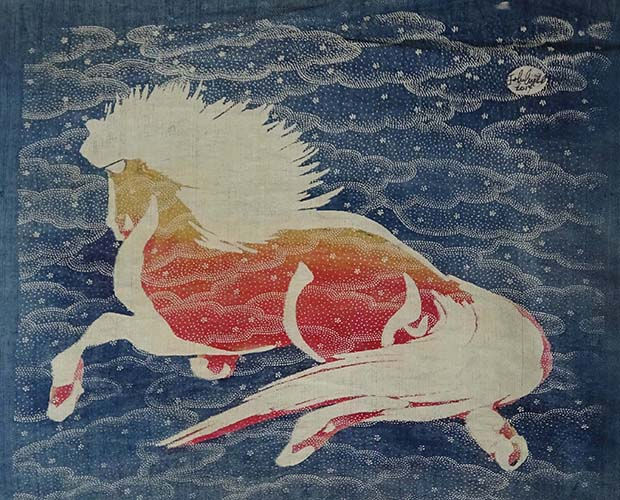
TWELVE SESSION COURSE
This twelve-session program covers every facet of traditional Japanese katazome along with innovative variations straight out of John’s brain – from single stencil imagery to repeating patterns, from bingata to kata-yuuzen. We'll be working on silk, cotton, hemp, wood, leather, copper, tiles, paper, and even glass!
The series is broken into four segments of three sessions each. Every session is offered as an intensive two-hour Zoom presentation with roughly half the time spent on understanding the process involved and half focusing on projects designed to bring the concept to life.
You may join ala carte or sign up for the entire series at a substantial discount.
$985 for the entire program
$325 per three-session segment
or pick and choose as you like, $125/individual session
Each session is recorded, available for you to download and keep for future reference. You're also welcome to follow up by emailing your questions to John for a thorough response.
Or select topics ala carte - Full segments are $325, individual chapters are $125.
Segment ONE – developing a clear foundation of knowledge from which to build
1 – A Definition and Description of the Broad Uses of Katazome in Japan
● survey of the major branches of katazome – egatazome (bingata), katayuuzen and sarasa, and chuusen.
● in-depth presentation of the five basic design styles of stencils and the uses of each.
● preparing single stencil designs vs designs requiring layered, compound stencils; stencils destined to be used with a resist vs stencils used to apply color directly
1 – B Stencils Used to Apply Resist
● Preparing Cartoons
● Translating Cartoon to Carved Image
● Carving Tools and Techniques
● Carving Accurate Registrations for Repeating patterns
1 – C Designing and Cutting Compound Stencils
● Designing Compound Stencil Cartoons
● Parsing Color Stencils
● Testing for Accurate Registrations
● Varying Colorways
● Lacquering Stencils
Segment TWO – Working with a Range of Resists and Sizing Options
2 – A Fabric Prep and Sizing Options
● Scouring Fabric
● Soymilk Options
● Funori (marine alga, Gloiopeltis)
● Nikawa (agar agar)
● Less Common Options
2 – B Rice Paste Resist Options
● Understanding How the Ingredients Function
● Substituting Ingredients
● Cooking Options
● Storage and Preservation
● Removing Paste Resist
2 – C Exploring Non-Japanese Resist Options
● Working with Wax
● Working with Gutta
● Working with Soy/Calx, and Other Regional Options
Segment THREE – Dyeing
3 – A Working with Natural Dyes vs Synthetic Dyes
● What Constitutes a Dye?
● Range of Dyes Suitable to Katazome
● What Constitutes a Dye?
● Preparing Natural Juice Dyes
● Mordants
● Preparing Natural Pigments and Lakes
● Combining Natural and Synthetic Dyes
3 – B Applying Colors
● Bingata Style (Using Paste Resist, Direct Color Application with Brushes)
● Katayuuzen/Sarasa Approaches (Brushing Color through Compound Stencils)
● Chuusen Dyeing (Single Stencil, Vacuum Table Color Application)
● Nassen Dyeing (Dyeing with Colored Paste
3 – C Vat Dyes
● Indigo Reduction Vat
● Synthetic Dye Vats
● Combining Vat Dyes with Non-Vat Dye Techniques
Segment FOUR – Studio and Beyond
4 – A Using Katazome to Embellish a Range of Surfaces and Materials
● Paper
● Wood
● Tiles
● Copper
● Glass
4 – B Studio Project, Start to Finish
● Design Garment to Include Matching Seams
● Compound Paste Resist, Masks, and Color Layers
● Specialized Brushes and Color Application
● Removing Resist
● Constructing Garment
4 – C Getting Your Katazome Studio Up to Speed
● Caring Your Stencil Collection
● Preparing a Paste Table and Alternatives
● Curing Your Dyed Pieces
● Making Your Own Brushes
● Constructing Harite
● Making Your Own Steamer











































